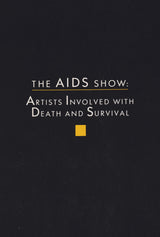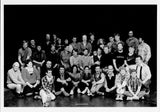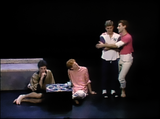Milestone Films
The AIDS Show
"A complex production, often deeply moving, sometimes very funny, that gets away from the sanitizing "objectivity" of a news report or panel discussion." -New York Times
One of the most important documents of the AIDS epidemic, THE AIDS SHOW was filmed in 1986 in the very early years of the crisis. The AIDS (Artists Involved with Death and Survival) Show deals with the impact of the epidemic on the community most affected by the disease - gay men. This unique work, one of the first films to deal with the subject of AIDS, was based on San Francisco's long-running Theatre Rhinoceros stage production of the same name. It speaks to everyone who has ever thought about AIDS or any terminal disease. Excerpts from the play have been combined with interviews with the show's creators and performers, along with a personal narration by the filmmakers — Peter Adair & Rob Epstein — to produce a powerful hybrid of documentary and drama. Preserved by Metropolis Post from the best materials, courtesy of Rob Epstein and Telling Pictures.
Background & Production of The AIDS Show film
Adair and Epstein first met when the latter answered an ad in a San Francisco gay newspaper: “We are looking for a non-sexist person to work on a documentary film on gay life. No experience necessary, just insane dedication and a cooperative spirit.” Epstein was a young man who had just moved to San Francisco from his home in New Jersey. They established a friendship and as part of the six-member Mariposa Film Group, they helped create a film, Word is Out (1978), that was revolutionary. As a documentary about gay life by gay filmmakers, its success opened this world to a mass audience. With this film, Epstein established his distinguished filmmaking career. His next film, the 1984 documentary The Times of Harvey Milk won an Oscar and became a landmark in gay and world cinema culture.
Peter Adair and Rob Epstein were both surrounded by the AIDS crisis and its devastating effect on the gay community. Because very little creative media had been produced depicting the AIDS crisis in a narrative style, Adair and Epstein wanted to produce something investigating this topic. “We wanted to explore the fear and psychological turmoil it was causing in San Francisco’s gay community — the invisible effects of the epidemic,” said Adair. Epstein was quoted in the Los Angeles Times, “As gay men, AIDS was becoming more and more prominent in our minds and in our lives, as more and more people we knew were dying of the disease. We haven’t yet seemed to be able to control the virus, except to try to prevent its spread, but we can take some control emotionally.”
When the pair saw “The AIDS Show: Artists Involved with Death and Survival,” on stage, they realized that the play worked on numerous levels as both entertainment and a resource. Its irreverence, tenderness and outrageous sense of humor aimed at deflating the horror of the crisis. Epstein said when he first saw the play, “It hit me like a ton of bricks emotionally. It brought so much into focus.” Adair said, “One of the things the play didn’t do was to take a passive attitude toward the epidemic. The actors in the play had stopped running, stood their ground, looked at the disease and said, ‘Wait a minute.’”
Adair and Epstein wanted to document the nationally recognized play and its creators. They raised the $100,000 for the documentary mostly from the gay community — from San Francisco cocktail parties, to passing the hat in Omaha, to seeking funding from social-service organizations. Filming the interviews, they tried something different. Not wanting to use the same Q&A technique they employed on Word is Out, instead the filmmakers handed each person a list of questions on a 3x5 index card, turned on the camera and left the room.
Epstein said, “We wanted to be emotionally restrained, to counterpoint this highly dramatic theatrical material. Had we been behind the camera, we’d have been more prone to probe and zoom in, emotionally underscoring their words.”
At the time of its making, Epstein and Adair credited their producer, KQED public television, for their courage in allowing them to make this film. Adair said, “It’s probably the most ‘inside’ gay film ever put on TV. It portrays social interactions among gays in a way that’s neither purged nor sanitized. I wasn’t sure how ghettoized it was at first, but when we asked the people at KQED whether we should cut back the campy humor and sexual references, they always encouraged us to take the more courageous route. The felt the messages were larger than just gay men talking to gay men.”
The post-production was particularly difficult for the two experienced filmmakers. For six months of work, they were feeling that each cut was worse than the last. They invited the cast and creators of The AIDS Show to a rough-cut screening where Doug Holsclaw deemed it heavy-handed and depressing. All in all, it took 23 different cuts before they were satisfied that they had gotten the mood of the play — and the community — correct.
(All quotes not noted are from the San Francisco Examiner, June 22, 1986, “Stage Revue is Backdrop for a Look at Fear, Realities of Dread Illness” by Edward Guthman)
An Explanation of Home, Classroom, and Public Performance Rights
Through our distribution partner, Kino Lorber, Milestone provides a variety of licensing to suit all needs. Our standard institutional licensing packages are designed to provide colleges, universities and qualified non-profits with the best value for multiple uses, and our one-time community screening licenses allow any organization to exhibit high-quality films for a reasonable fee. Please note that all licensing carries restrictions on audience numbers and/or geographic range.
STANDARD INSTITUTIONAL LICENSING
- CLASSROOM RIGHTS allow unlimited use in face-to-face classroom situations for the life of the media, restricted to a single campus or location. Please note that this license doesn't include public screenings or digital transmission of any kind.
- PUBLIC PERFORMANCE RIGHTS (PPR) allow educational and nonprofit groups to exhibit our films to groups of 100 or fewer individuals where admission is not charged. The term of the public performance license is for the life of the DVD. However, if you intend to charge admission, expect an audience over 100, or publicly advertise the screening, then we ask that you contact us regarding an exhibition fee. Films purchased without Public Performance Rights are restricted for individual viewing or face-to-face teaching in the classroom only.
- DIGITAL SITE LICENSES (DSL) allow colleges, universities and nonprofits to locally host and stream to their community on a closed, password-protected system for the life of the digital file.
- K-12 PPR comes with limited performance rights so films can be shown in classrooms, at PTA meetings, during after school programs, and transmitted on a closed-circuit system within a K-12 school building or on a single campus.
For all educational licenses and screenings, please Estelle Grosso, Director of Educational and Non-Theatrical Sales & Distribution at Kino Lorber (Milestone’s distribution partner) at: egrosso@kinolorber.com.
The purchase of DVDs, DVD-Rs, and Blu-rays at the institutional rate by anyone outside of a North American non-profit educational institution does not grant rights for public performance or streaming.
Any continuous or loop screenings as part of a museum exhibition must also be licensed separately. Inquiries must be negotiated directly by emailing egrosso@kinolorber.com.
Information for Exhibitors Screening DCPs and Film Prints
All bookings must be made by email correspondence with George Schmalz, Director of Theatrical Sales at Kino Lorber (Milestone’s distribution partner) at: gschmalz@kinolorber.com to negotiate terms and insure a screening copy is available. An order is only finalized when Kino Lorber sends written confirmation.
DCPs are shipped insured for their cost via Federal Express or UPS and must be returned the same way or by an equivalent method. Shipping and handling charges for outgoing DCPs appear on your invoice. The immediate return or transshipment (as directed) of all DCPs is your responsibility.
DCPs should be returned to:
Milestone Film & Video
38 George Street
Harrington Park, New Jersey 07640-0128
United States
35mm and 16mm prints are shipped insured for their cost via Federal Express or UPS and must be returned the same way or by an equivalent method. Please do not ship prints back via US Mail. Exhibitor pays to ship both ways. Shipping and handling charges for outgoing prints appear on your invoice. The immediate return of all prints is your responsibility.
Prints should be returned insured for $1,000 to:
Iron Mountain
Attn: Milestone Account
235 Main Street
Little Falls, NJ 07424
201.944.3700
For public screenings, advertising materials can be requested by contacting jhertzberg@kinolorber.com.
Milestone is the exclusive licensor for all the titles in this catalog, all of which are available from Milestone’s distribution partner Kino Lorber. in their complete versions.





